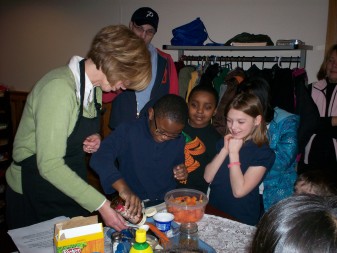March 18, 2014 // Local
Food for Thought program empowers families

Edie Sutton from Purdue Extension Service shows Food for Thought students how to measure ingredients for a carrot and raisin salad at family dinner night.
By Allison Ciraulo
SOUTH BEND — In an impoverished neighborhood with no parks and high crime rates, the St. Vincent de Paul Society of St. Joseph County is reaching out to families through educational and nutritional enrichment.
The Food for Thought program began in the fall of 2012, born out of the desire of St. Vincent de Paul Society staff to make use of their spacious facility and to engage with the families in their neighborhood. The staff’s discussions and research led them to Perley Fine Arts Academy, located a few blocks away.
“We sat down with the principal and said, ‘What do your students need?’” says Anne Hosinski Watson, executive director of St. Vincent de Paul Society of St. Joseph County.
Perley had two main needs: supplemental education, through homework help and preparation for standardized testing, and outreach to families, particularly relating to food and nutrition. The St. Vincent de Paul Society staff met with Nicole Smith, a family and community specialist at Perley, and together they crafted a program that could meet both of these needs.
Food for Thought runs on Tuesday and Thursday afternoons between 3-5 p.m. in two upstairs conference rooms at the St. Vincent de Paul Society building on Crescent Avenue. When the students arrive, they pick up a healthy snack prepared by volunteers, and sit down with a tutor to start their homework.
After about 45 minutes of work time, Smith introduces an enrichment activity to the entire group. On Tuesdays the focus is on language arts, while Thursdays are devoted to math, with an eye towards preparation for ISTEP, Indiana’s statewide assessment tests.
Twice during each eight-week session, Food for Thought hosts a “family dinner night” in the St. Vincent de Paul Society dining room. A volunteer from the Purdue Extension Service designs a meal plan that the families can replicate at home, based on healthy, budget-friendly ingredients. The presentation incorporates math, reading and even chemistry as the students walk through the steps of cooking the meal.
At the last family dinner night, the families learned to make a simple soup that included noodles, tomato sauce, beans and beef broth. Through a grant from Meijer, the food is provided at no cost to the families and they are sent home with extra ingredients so that they can make the meal again.
Family dinner nights are at the heart of what Food for Thought seeks to accomplish.
“The kids are involved in the lesson and the parents are also learning the recipe,” says Hosinski Watson, “But most importantly, families are sitting down together and talking.”
Increased communication within families as well as among families in the program is what the St. Vincent de Paul Society staff hopes will strengthen the social fabric of the neighborhood and improve academic outcomes for its students.
The hope, Hosinski Watson says, “is that the next time a mom is helping her daughter with homework, she can call another mom and say, ‘Hey, my third grader is having problems with this math lesson. Is your third grader having problems with this math lesson? Can we talk about it?’”
“That’s one of the main goals of this program,” she notes.
While Food for Thought has an open enrollment, Smith invites families who she believes would especially benefit from the program. Now on staff at McKinley Primary Center, Smith works with her counterpart at Perley to identify possible participants. Food for Thought currently serves about 22 students from both Perley and McKinley.
Assistant Programs Director Angela Leo says the program is entirely volunteer run and funded only by grant money for the food.
“It couldn’t happen without the volunteers,” she says.
Among the current volunteers are students from Saint Joseph High School, Saint Mary’s College, and the University of Notre Dame, as well as several retirees.
Food for Thought is what Hosinski Watson and her staff regard as a “Step 2” program. While St. Vincent de Paul Society meets emergency needs in the community by providing food, furniture, clothing and financial assistance, Food for Thought is designed to address an ongoing need with the hope of far-reaching benefits for students and families.
“We’re looking at next steps. When these kids graduate from elementary school, what can we offer them as junior high kids? What can we offer them as high school kids? In five years I would love to see the kids who started with the program serving as tutors, reinvesting in their own community.”
While it’s still early to evaluate the long-term results, Smith already sees the difference that Food for Thought is making in her students’ academic progress.
“I think that it has built confidence in the students,” she says. “I get feedback from the teachers at my school who say the kids are bringing back their homework and are excited about knowing their multiplication facts better.”
Smith, who has been working in the public schools for 10 years, hopes that the program will expand to other schools in the district.
“It could change a lot of kids’ lives,” she says.
The best news. Delivered to your inbox.
Subscribe to our mailing list today.






